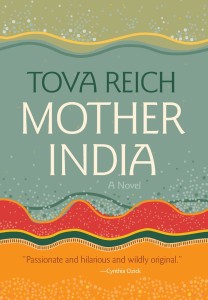Tag : Tova Reich
February 13, 2019 by Yona Zeldis McDonough
A Novel Satirizes Jews and India
 Mother India is a novel that offers a rich, kaleidoscopic view of both the titular country and its multi-faceted culture. The religious Jews who populate the novel add yet another layer of complexity. Fiction Editor Yona Zeldis McDonough talks to author Tova Reich about how the India-Jewish connection has shaped her thinking and her work.
Mother India is a novel that offers a rich, kaleidoscopic view of both the titular country and its multi-faceted culture. The religious Jews who populate the novel add yet another layer of complexity. Fiction Editor Yona Zeldis McDonough talks to author Tova Reich about how the India-Jewish connection has shaped her thinking and her work.
YZM: Tell us something about your own relationship to India.
TR: One of my major preoccupations, I’ve always felt, is religion (and not only Judaism), its ultimately tragic human quest for meaning, and what seems to be its inevitable apocalyptic thrust toward extremism and zealotry. I’ve written about seekers in Israel in my novel Master of the Return, about political fanaticism in my novel The Jewish War, and what might perhaps be called social extremism played out in the marginalization/suppression of women in my novel One Hundred Philistine Foreskins.
- No Comments
August 2, 2018 by admin
What the Lilith Staff is Reading Now
Welcome to another installment of this occasional recurring feature in which Lilith staffers reveal what books are on our nightstands, our e-readers and tucked in our bags for the commute. Share your own summer reads in the comments!
Kira Yates, Intern:
This summer I’ve decided to read two books at once: The Guide for the Perplexed by the Rambam himself, Rabbi Moshe ben Maimon, and The Heart is a Lonely Hunter by Carson McCullers. Though one was written in 1190 Spain and the other in 1940s Georgia, the theological treatise and the novel explore God and the actions of human kind. In his investigation of Jewish philosophy, ben Maimon seeks to prove that God does not have a body–an assertion that became a scholarly sensation across Europe. McCullers, on the other hand, tells the story of four struggling people in a small Georgia town, a reminder of what it feels like to be forgotten and in search of human connection. Published 750 years apart, these books present parallels about the human need for understanding and unity with something greater than the self.
- No Comments
 Please wait...
Please wait...